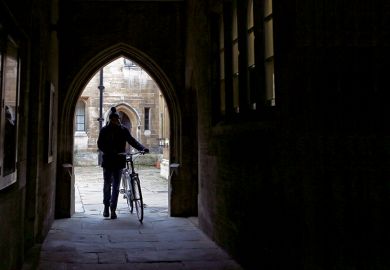It is not hyperbole to say that we have reached a moment of real crisis regarding student mental health.
The 2017 annual report of the US Center for Collegiate Mental Health found that there was a 6.7 per cent increase between the 2010-11 and 2016-17 academic years in the proportion of students who attended counselling and, among those students, a rise in the proportion who made a suicide attempt, from 8 to 10 per cent. Clinicians reported that their clients’ top concern is now anxiety and depression.
As educators, we have personally witnessed this rise in mental ill health among our students. In our Baruch College community, Kevin Maniramapa jumped to his death during finals week in May of 2014: a public display of profound pain that affected us all.
The problem is not confined to universities. A recent Centers for Disease Control (CDC) report found that suicide rates have increased in nearly every state since 1999. And a 2017 report by the World Health Organisation found that the number of people suffering from depression exceeded 300 million in 2015: 4.4 per cent of the entire global population.
But approximately three-quarters of mental health disorders manifest by the age of 24, so higher education institutions are among the primary spaces where a confluence of risk factors – the stresses of adjusting to new social and intellectual expectations – can create a crisis. And while heroic efforts are being made in some universities to provide screenings and treatment, very few institutions are able to provide the appropriate resources.
Often individuals present with multiple issues; for example, a mental illness may occur alongside substance use disorders. How realistic is it for college counselling centres to shoulder the weight of this crisis when the ratio of certified counsellors to students is between 1:1,000 and 1:2,000 even at small colleges – and up to 1:3,500 at large universities?
The answer is to enlist the help of students, staff and faculty. According to the Association for University and College Counseling Center Directors’ 2016 annual survey, nearly 60 per cent of centres already offer staff and faculty “training” on mental health issues. But this is usually in the form of mental health presentations at new employee orientations, or the dissemination of resources such as how-to-help brochures. Such approaches have limited ability to teach the necessary skills to address a student’s (or colleague’s) mental health concerns. Let’s be honest: as educators, how often do we read how-to-help brochures, and how confident do we feel when asked to put the suggested strategies into action?
According to a recent CDC pamphlet, the main strategies to prevent suicide include creating protective environments, promoting connectedness, teaching coping and problem-solving skills and identifying and supporting people at risk. College can offer space for students to develop their abilities and explore the world and their place in it. But how do we reconcile efforts to make students challenge themselves and learn the benefits of “failure” and facing adversity with a competitive assessment system where an A has no meaning unless another student receives an F?
What is needed is a collaborative and institutional approach based on practical training in “relational advisement” – particularly for staff and faculty who interact with students most frequently. This approach has two core principles: building trust with the student and establishing a connection between the student, the adviser and the institution.
At Baruch, we have implemented “Mental Health First Aid” (MHFA) training for staff, faculty and students. This is an evidence-based, eight-hour training programme designed to provide participants with the skills to respond to signs of mental illnesses and substance use disorders. The training – typically facilitated gratis by local non-profit organisations and governmental agencies – includes hands-on activities, an overview of local resources, a resource manual and a simple action plan consisting of advice such as to listen non-judgementally, give reassurance and information, and encourage both self-help and appropriate professional help. It is often compared with first aid training since it focuses on training first responders, not experts in medical diagnosis.
The issue is that while students and professional staff are often able and willing to spend an entire day at a training session, faculty members find it harder to make the time. They need to be compensated for it – especially the adjuncts. At our institution, faculty members earmarked to teach an online course for the first time are generally required to participate in two weeks of paid training. Universities obviously see the value in properly training faculty to teach these courses. A similar view should be adopted regarding student mental health.
Faculty are in a unique position to notice when a student may be experiencing a mental health problem and early intervention can help reduce its severity and impact. But in addition to having as many community members as possible trained in MHFA, processes need to be in place to support them.
We have a campus intervention team composed primarily of administrators and counselling centre staff, to whom concerns about someone can be submitted anonymously via an online form (anonymity is particularly appropriate for students worried about classmates). The team is responsible for looking into the situation and developing a course of action.
Yes, mental health is a challenge that can overwhelm our senses. But we do not have to face it alone – we can work together to bring understanding and healing to our communities.
Clemente I. Diaz is associate director of College Now, a dual enrolment programme at Baruch College, City University of New York (CUNY) and an adjunct faculty member. Douglas A. Medina is associate director of Baruch’s honours programme and a certified Mental Health First Aid trainer. They are co-chairs of the Baruch College Advising Alliance, a collaborative, cross-departmental group of staff who provide direct service to students. To reader a longer version of this article, click here.
POSTSCRIPT:
Print headline: Creating lifelines
Register to continue
Why register?
- Registration is free and only takes a moment
- Once registered, you can read 3 articles a month
- Sign up for our newsletter
Subscribe
Or subscribe for unlimited access to:
- Unlimited access to news, views, insights & reviews
- Digital editions
- Digital access to THE’s university and college rankings analysis
Already registered or a current subscriber?








